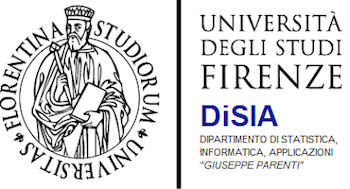

- This event has passed.
DiSIA Seminar

Speakers: Nedka Nikiforova, Valentina Tocchioni, Pamela Vignolini (DiSIA – Università degli Studi di Firenze)
Title:
Nedka Nikiforova: Design of experiments for technology and for consumers’ preferences
Valentina Tocchioni: A snapshot of my research: from childlessness to higher education research
Pamela Vignolini: Crocus sativus L. flowers valorisation as sources of bioactive compounds
Abstract:
Nedka Nikiforova:
Design of experiments (DoE) is a wide and fundamental methodology of the statistics theory. It plays a relevant role to improve and solve issues in the fields of technology and consumers’ behaviour. In this seminar, I will present a general overview of my research related to DoE. First, I will focus on a study related to a split-plot design in the technological field. Following, I will address computer experiments and Kriging modelling to solve complex engineering and technological issues, for which physical experimentation could be too costly, or in certain cases, impossible to be performed. Lastly, I will present my research related to innovative approaches to build optimal designs for the technological field, and for choice experiments to analyze consumers’ preferences. A further research topic related to the field of quantitative marketing will be also briefly outlined during the talk.
Valentina Tocchioni:
During this seminar I will illustrate a general overview of my past research. In particular, I will concentrate on four socio-demographic topics I have been dealing with, such as childlessness, family dynamics – family formation, fertility, and divorce – and their interrelationship with economic uncertainty, sexual behaviours, and higher education in terms of students’ university tracks and PhD students’ and graduates’ work trajectories. Most of the presentation will be based on previous published research, but some hints of actual and future directions of my research will be given.
Pamela Vignolini:
The application of circular economy principles is of particular interest for the agricultural and agri-food sector, given the large amount of waste matrix of some plant species. In recent decades the attention towards the cultivation of saffron (Crocus sativus L.) has been rediscovered. The saffron produced from dried stigmas of Crocus sativus L. has been known since ancient times for its numerous therapeutic properties. The spice is obtained from the stigmas of the flowers, while petals and stamens are 90% waste material. The recovery of the flowers, considering the considerable amount of polyphenols with high antioxidant activity present in this matrix allows its use for innovative purposes in different product sectors such as foods, cosmetics and biomedical applications. In this context, the present work evaluated the polyphenol content in flowers of C. sativus grown in Tuscany, in order to characterize this product from a qualitative-quantitative point of view for various product sectors. The quali-quantitative analysis of the extracts was carried out by HPLC/DAD/MS analysis. Given the potential of this matrix, another aspect of the research consists in evaluating the possible tumor growth inhibition activity on bladder cancer cell lines by the extracts of petals.
The seminar will be held at noon on Tuesday 17th of January 2023, in Aula 205 (ex 32) (DISIA – Viale Morgagni 59).
Check the DiSIA website out!